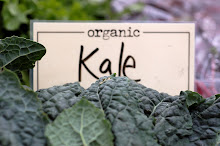
Slow Food Nation was just as much fun although several times during the Food For Thought panels I wasn't smiling. I know I live in a San Francisco bubble, but I didn't know farmworkers live in found material and blue tarp shacks built into bushes. That it's happening now. That they often can't afford the food they pick.
I had no idea there are 181 free food pantries in San Francisco.
I didn't know the extent of empty calories being served in school lunch programs; that there are schools with police parked in front of them all day. Likely not eating the food served inside.
It took me by surprise that the Gates and Rockefeller Foundations are investing in GMO seeds to green Africa; that crop yields are expected to decrease due to climate change, that our industrial food systems are not giving us more food by eliminating biodiversity.
And now that I do know these things, what do I do?
I came home and made a pot of brown rice. It's my first solution to everything.
Here's a sampling as random as a dime in a dish of what the panelists offered us to do.
Alice Waters urged us to be hopeful, plant a tree. Michael Pollan asked us to endorse the Food & Agriculture Declaration. He suggested tearing out the front lawn to plant a garden.
Eric Schlosser, with his calm, nearly hypnotic gaze, incited a call for a movement to bring awareness to the exploitation of farmworkers and the people that bring food to our tables. Maricela Morales pleaded with the audience to talk about fair food.
Carlos Petrini with hand gestures that didn't need translation rallied for everyone to meet their farmers. And Vandana Shiva instructed us to keep small farms alive.
Wendell Berry plainly said, "Ask your neighbor what they need. They are useful," he finished.
They were all one good dish.
(I believe the panels will be available at FORA.tv later this week and I will post a link when I see them.)
Here's the first panel discussion of the Food For Thought Series, each of which I'll add to as they become available:
The World Food Crisis
Relocalizing Food
A New Fair Food System
Climate Change and Food
All the Panels at Slow Food Nation
7 hours ago

6 comments:
I'm so glad you and other bloggers attended these panels and can report back. I wanted to go and ended up flat on the couch all weekend instead. Thanks for taking the time to learn these harsh realities and share a few with us.
What a wonderful post. Angering, heartbreaking, but wonderful. There are a lot of little things we can do to influence or attempt to change the current (exploitative to both workers, children, poor folks, animals, and the earth) way of doing things. But it takes all of us, doing our little part.
Thank you for taking the time to remind and educate us on what you learned.
Thank you, Katrina. You are being the change.
Katrina, I think we may have overlapped at some of the panels. I'll post more on what I came away with over the next couple weeks. Honestly, I do feel as if I learned enough to post about it every day for the next month. Eye opening and, while heart-breaking, also hopeful. Awareness is the first step.
I second fpf's comment -- I'm so glad you attend conferences like this and tell us all about them! Thanks!
fpf - Ahhh. Slow couch. That's as important as slow food sometimes. Good for you.
jennifer - It was probably the balsamic strawberry ice cream that made all the rough news easier to swallow. Odd combination but it was ridiculously good.
tamara - Actually today I played way too much computer solitaire but tomorrow is always a new day. Thank you.
green bean - I looked for you but it was useless. There were too many people. I'm still swirling in all the information too from the panels. Keep posting about it. It's all good stuff. Even when it's not.
donna - I was in good company. It's estimated there were 50,000 people that attended over the three days. They weren't all at the panels but real food was being eaten none the less.
Post a Comment